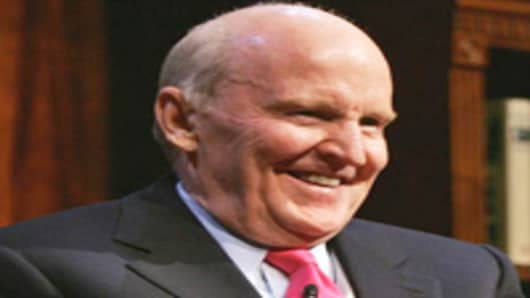The US government should freeze regulations and cut marginal tax rates in order to boost hiring and stimulate the U.S. economy, former General Electric chairman Jack Welch told CNBC Friday.
"I would absolutely freeze all regulations until the unemployment rate got to 6 percent or less," Welch said. "I would freeze it, and I would go at every regulation hard that is there now and see whether or not the cost-benefit really does work to get that stuff out of there."
Welch, who is a CNBC contributor, also said he would extend the age of eligibility for Social Security and Medicare or even giving up Social Security payments entirely.
Unemployment remained at 9.1 percent in August as the U.S. economy created no new net jobs for the first time since World War II.
Welch said he would reform the tax code to support new investment and new ventures.
"I would give tax holidays for a period of time," he said. "I would get rid of loop holes and lower rates. I would have marginal tax rates go down so incentive goes up dramatically."
Although Welch called billionaire investor Warren Buffett "the smartest investment head in years," he said he would not take a tax lesson from the chairman of conglomerate Berkshire Hathaway .
Buffett recently urged U.S. lawmakers to raise taxes on the country's super-rich to help cut the budget deficit, saying the tax increase would not hurt investments.
Invoking what he called the "Buffett Rule," President Obama called for a new minimum tax rate for individuals making more than $1 million a year. The tax increase would help pay for a $447 billion jobs package that Obama unveiled earlier this month to help boost the U.S. economy.
Although the U.S.'s unemployment remains high, Welch said he does not see it in the same situation as debt-riddled Greece.
"The U.S. doesn't have the same problems as Europe has," he said. "There is no question that Greece is broke. Now I don't know how they get out without getting out of the euro."



